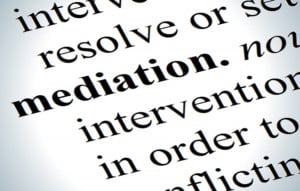 Tips on how to approach mediation, and how to explain the process to a client.
Tips on how to approach mediation, and how to explain the process to a client.
“An old adage says that a successful mediation leaves neither party completely happy. Sticking to your guns is best for arbitration or litigation, not mediation”
Expert Advice – Mediation Tips
Success in mediation does not depend on technical tricks, but rather, on a fundamental understanding of the dynamics of the process. Here are several points to bear in mind when considering the mediation process or explaining it to a client:
- Mediation is not arbitration or a trial. Mediation is a distinct procedure. Arbitration and traditional litigation involve the submission of a dispute to a third-party neutral (or judge or jury) for binding resolution. Those are adjudicative processes, and in the case of arbitration, there is limited judicial review of the outcome. Mediation, in contrast, is a facilitative process. The mediator has no power to impose a decision, and uses the power of persuasion to assist the parties in arriving at a mutually agreeable settlement.
- It’s not combat. In mediation, there is no winner or loser. Be prepared to compromise. An old adage says that a successful mediation leaves neither party completely happy. Sticking to your guns is best for arbitration or litigation, not mediation.
- There is no face off. In mediation, the parties do not have to confront each other. Indeed, modern technology, such as videoconferencing, allows parties and mediators to skip a joint physical session if they so choose. In fact, mediation is especially amenable to online dispute resolution, where the participants can have every aspect a settlement negotiated online.
- Interests and Needs v. Demands. In mediation, the focus should be on what a party needs, and not merely what a party demands. Money may be only part of the solution; in many cases there are additional considerations, such as a client’s emotional need for an apology, or the need to save face. Discerning these interests and needs, and distinguishing them from a party’s demands, requires good listening skills.
- Both sides can win. Mediation is not a zero sum game. Too often, advocates think of mediation a process in which their client gets something and the adversary doesn’t. But that’s not always the case. One the many benefits of mediation is the ability to craft a creative solution that gives both parties something meaningful.
- Here’s a well-known example: A parent enters the kitchen and finds her two small kids locked in an argument over the last remaining orange in the refrigerator. Each one demands the orange (their demand or position). The parent, exasperated, grabs a knife, slices the orange in two, and gives a half to each kid. Good solution, right? Maybe not. It turns out one kid wanted the juice of the orange while the other needed the rind to bake muffins.
- There are two lessons in this parable. First, a mediated resolution is not necessarily a win-lose prospect; second, the mediator must learn the parties’ needs before attempting to craft a solution.
- Caucuses help. One beauty of mediation is that the mediator can have separate discussions with each party. Mediators are encouraged to engage in such discussions —called caucusing—so they can give candid feedback to a party and vice versa.
- Be creative. Litigation and arbitration result in decisions designed to addresses the parties’ claims. A mediator, however, has infinite flexibility and can craft creative solutions that go beyond what the parties are demanding or what a judge or arbitrator could order. Think of that story about the orange.
- Confidentiality. In mediation, parties get a reverse-Miranda warning: What you say cannot and will not be used against you. One reason mediation works so well is because parties can be completely candid without fear that their statements will become evidence at trial (or that the mediator will someday become a witness).
- Ownership. A settlement built by the parties is far better than one imposed on them. By spending their time to work with the mediator to construct a solution, the parties have an investment in the ultimate resolution of their dispute and in appropriate cases, mediation presents an opportunity to maintain a working relationship between parties who happened to fall out in a particular instance.
- It works! The most important concept here is that mediation works. Although the vast majority of court cases and arbitrations eventually settle, mediated cases tend to resolve more efficiently and for less expense. And additional saving is that by ending the conflict, the parties can get back to their lives and businesses, hopefully to be successful at both.
Author: George H. Friedman is an ADR consultant and Chairman of the Board of Directors of Cloud-based Arbitration Resolution Services, Inc. He is an Adjunct Professor of Law at Fordham Law School, where he teaches dispute resolution.
EDITOR: Bo (+ Fact & Law)





